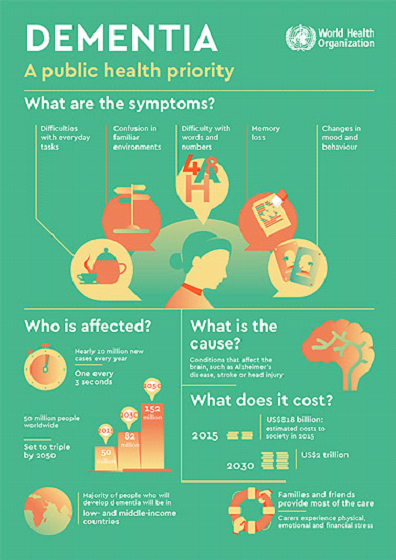The Physiological Impact of Dementia in Women and How You Should React

Dementia is a neurodegenerative disorder that damages the brain cells as it proceeds. In most of the cases of the mental disease, there is no cure, which is why the disorder is recognized as a progressive killer.
On top of this, the rates of dementia patients are nowhere near declining. The disorder victimizes a new person every three seconds. Moreover, dementia is biased in its selection of patients, as it shows a preference for women. Consequently, there are higher numbers of women affected by all types of dementia including mixed dementia.
Alzheimer’s Association confirms that approximately two-thirds of cases of the disease are women. This equates to 3.2 million female dementia patients out of the total 5 million sufferers in the US. The same situation prevails in the UK, where there are 61% women dementia patients. Only 39% are male.

Dementia is a psychiatric condition. However, this does not mean that there are no physiological implications. The main affected is the body’s central processing unit, the brain, that controls all functions of the body. Subsequently, its damage by any kind of dementia results in physiological impact.
Here is an in-depth look at the physiological impact of dementia in women:
1. Loss of fine motor skills
This is a common effect that surfaces in numerous ailments including Alzheimer’s dementia. It becomes difficult for a person to accomplish small things such as buttoning shirts, problems writing neatly, threading a needle or so. This is chiefly due to the loss of motor skills.
Research explains that this happens as people lose their muscle memory. The brain develops an automatic memory of common tasks, which is called muscle memory. However, dementia is mainly an ailment that steals memories, so it does not hesitate in taking the muscle memories too. This makes it challenging for an individual to walk normally, resulting in shorter steps.
Some steps for dealing with this problem are:
? Do not panic
? Offer assistance, however, do not be invasive so that it doesn’t hurt the patient’s dignity

2. Lack of sleep
Another common physiological impact of dementia is insomnia. This problem snowballs as the ailment progresses. A study indicates that insomnia is common among 40%-60% of people with dementia. It is typical for the sleep cycle to be on the fritz, resulting in Sundowners Syndrome. This is characterized by an increase in agitation, anger, and confusion as the sun goes down.
Sleep problems can culminate in four different ways. Firstly, it occurs in the form of trouble in falling asleep or staying asleep. Secondly, it can emerge as excessive daytime sleepiness. Thirdly, the sleep disorder may come to a crescendo of nocturnal hallucinations. Lastly, sleep problems may occur in the form of apnea or restless leg syndrome.
Some measures for dealing with sleep problems include:
? Increase physical activity during the day
? Maintain a regular sleep routine
? Avail bright light therapy
? Restrict the bed for sleeping only. Eating, resting, watching TV, and other activities shouldn’t be conducted in bed
? Maintain a quiet and dark sleeping environment at night and discourage afternoon naps
3. Difficulty in swallowing
It is common for patients with dementia to experience problems in swallowing, which is known as dysphagia. 9 out of 10 dementia sufferers face this issue at some point. If a patient is unable to reveal about her chewing and swallowing problem, then one can figure it out via certain signs. Some of these include coughing, prolonged chewing, drooling food or saliva, weight loss, nasal regurgitation, and chest infection to name a few.
It is essential to note these signs if a patient is unable to tell herself. A patient doesn’t get proper nutrition if she can’t swallow properly. Antoinette Ryba, RN, patient advocate, care manager, member of the Hospice and Palliative Nurses Association and health coach emphasizes the importance. She points out, “Aspiration pneumonia [chest infection] is one of the most common causes of death in Alzheimer’s patients.”
Dealing with dysphagia entails:
? Provide soft textured food to the patient so that it is easy to swallow
? Blend fruits into a smoothie and dip the bread into soup or gravy to make it easy and soft to chew
? Encourage small bites
4. Difficulty using the washroom
Another debilitating physical impact of dementia is the poor control of one’s bladder or bowels. Incontinence is, however, an embarrassing problem. This can happen for many reasons. For instance, a person may struggle remembering where the washroom is located or an inability to communicate the need to go to the toilet.
It is also possible that the nerve pathway that controls bladder and bowel may be damaged. Or a person may forget that she needs to visit the toilet until it is late. Lisa P. Gwyther, MSW, adds to the list. She outlines, “People with early Alzheimer’s disease may forget to pull down their clothing when they sit to urinate.”
Extend help in the following ways:
? Caretakers should be supportive. They should assure the patient so that she does not feel embarrassed
? Do not scold
? Respect the patient’s privacy as much as possible
? Clear the way to the toilet by removing furniture and rugs that increase the odds of the patient tripping over them
? Remove wastebaskets, pots, and other like stuff that can be mistaken as the toilet
5. Other impacts
The degenerative brain disorder also results in repetitive behavior, wandering, and poor grooming habits. The Alzheimer’s Association reports that 1 in 6 people wander and get lost. They can get lost in familiar places. Dementia also makes it onerous for a person to perform familiar tasks.
At the same time, all these factors lead to poor hygiene and grooming habits. The main culprit behind these implications of the ailment is memory loss. A person remains confused on account of the inability to retrieve memories. This is why patients get lost and forget to perform routine activities.
A few measures for dealing with these are:
? Maintain and pursue a routine for daily activities
? Be calm in dealing with a repetitive demeanor as it is not the patient’s habit
? Use devices that indicate when a door is opened to save a patient from getting lost
? Keep the car keys hidden, and place locks out of sight
? Meet all the requirements of the patient, so she doesn’t have to wander
Wrap up thoughts
These physical impacts of dementia are prevalent since the onset of the disease. These only aggravate as the time passes and the disorder causes more damage. In the initial stages, a woman can take care of herself in some of the ways mentioned above. Later on, she will need assistance, and a caretaker can follow these measures.
About Alycia Gordan
Alycia Gordan is a freelance writer who loves to read and write articles on healthcare technology, fitness, and lifestyle. She is a tech junkie and divides her time between travel and writing. You can find her on Twitter: @meetalycia








